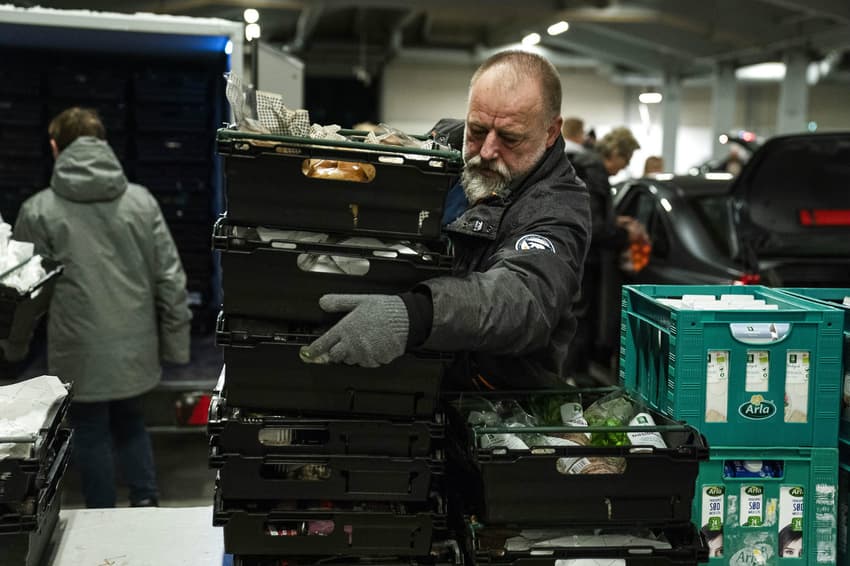Excess Christmas food shared between 30,000 people in Denmark

Charity Stop Spild Lokalt (Stop Waste Locally) has set a record by sharing 260 tonnes of excess Christmas food between 30,000 people in Denmark.
Up to 3,000 volunteers across the country helped out by collecting and distributing unsold goods from stores just after they closed for Christmas.
“It’s gone over and above our expectations. The ambition was 200 tonnes, but we reached 260 tonnes from stores across the country,” 19-year-old Rasmus Erichsen from Korsør, the founder of the intiative, told Ritzau.
”It’s great that so many small stores wanted to take part, but also quite scary that the need is so great,” Erichsen added.
As many as 350 stores across the country donated pork roasts, duck, candy and other Christmas food to the project.

One of Stop Spild Lokalt's distribution points, at Bella Centret in Copenhagen. Photo: MartinSylvest/Ritzau Scanpix
Erichsen’s project is in just its second year. In 2017, a total of 110 tonnes of excess food was gathered by 2,100 volunteers.
The food collected from stores is donated to people receiving social welfare, senior citizens, students or others who struggle to make ends meet at Christmas.
Goods were distrbuted at schools, sports centres and other ’food oases’, including at one location in Greenland.
Erichsen said he intended to continue his Christmas charity project next year.
”We are going to repeat this successful venture, although I don’t yet know whether we might do it in a different way,” he said.

Rasmus Erichsen, second from left, began the project in 2017. Photo: MartinSylvest/Ritzau Scanpix
Stop Spild Lokalt has volunteers in 104 different Danish towns, and has partnerships in place with major supermarket chains including Coop, Salling Group and Aldi.
The group’s founder, who studies Innovation and Marketing, won the 2017 Fællesskabsprisen award, given in Denmark to entrepreneurs who make valuable contributions to society.
READ ALSO: Danish princess eats meal made from surplus in dinner against food waste
Comments
See Also
Up to 3,000 volunteers across the country helped out by collecting and distributing unsold goods from stores just after they closed for Christmas.
“It’s gone over and above our expectations. The ambition was 200 tonnes, but we reached 260 tonnes from stores across the country,” 19-year-old Rasmus Erichsen from Korsør, the founder of the intiative, told Ritzau.
”It’s great that so many small stores wanted to take part, but also quite scary that the need is so great,” Erichsen added.
As many as 350 stores across the country donated pork roasts, duck, candy and other Christmas food to the project.

One of Stop Spild Lokalt's distribution points, at Bella Centret in Copenhagen. Photo: MartinSylvest/Ritzau Scanpix
Erichsen’s project is in just its second year. In 2017, a total of 110 tonnes of excess food was gathered by 2,100 volunteers.
The food collected from stores is donated to people receiving social welfare, senior citizens, students or others who struggle to make ends meet at Christmas.
Goods were distrbuted at schools, sports centres and other ’food oases’, including at one location in Greenland.
Erichsen said he intended to continue his Christmas charity project next year.
”We are going to repeat this successful venture, although I don’t yet know whether we might do it in a different way,” he said.

Rasmus Erichsen, second from left, began the project in 2017. Photo: MartinSylvest/Ritzau Scanpix
Stop Spild Lokalt has volunteers in 104 different Danish towns, and has partnerships in place with major supermarket chains including Coop, Salling Group and Aldi.
The group’s founder, who studies Innovation and Marketing, won the 2017 Fællesskabsprisen award, given in Denmark to entrepreneurs who make valuable contributions to society.
READ ALSO: Danish princess eats meal made from surplus in dinner against food waste
Join the conversation in our comments section below. Share your own views and experience and if you have a question or suggestion for our journalists then email us at [email protected].
Please keep comments civil, constructive and on topic – and make sure to read our terms of use before getting involved.
Please log in here to leave a comment.